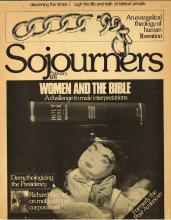Three thousand people gathered on Jan. 29, 1976, in the International Ballroom of the Washington Hilton Hotel for the National Prayer Breakfast. They represented, for the most part, the leaders in power and wealth from the United States and other nations.
There is an aura about the National Prayer Breakfast which pervades the gathering. With the Cabinet, many members of Congress, high government executives, leaders from the corporate world, heads of educational institutions, and religious celebrities, along with some others who lack such titles, there is a corporate sense of prelacy--being with other people of importance--that dominates the atmosphere for most who attend. The attention of all is directed toward the fact that the President is there with them--or, that they are there with the President. It is precisely the sort of atmosphere that would fill an Amos, Jeremiah, or Isaiah with profound discomfort.
How does the gospel of Jesus Christ address those at such an occasion? Can it penetrate through the fog of collective pretension so that its word can truly be heard? This is not a matter of underestimating the power of the Spirit, but simply recognizing the obstacles which the world inevitably puts in its path, and which seem particularly clear at such an event.
Read the Full Article

